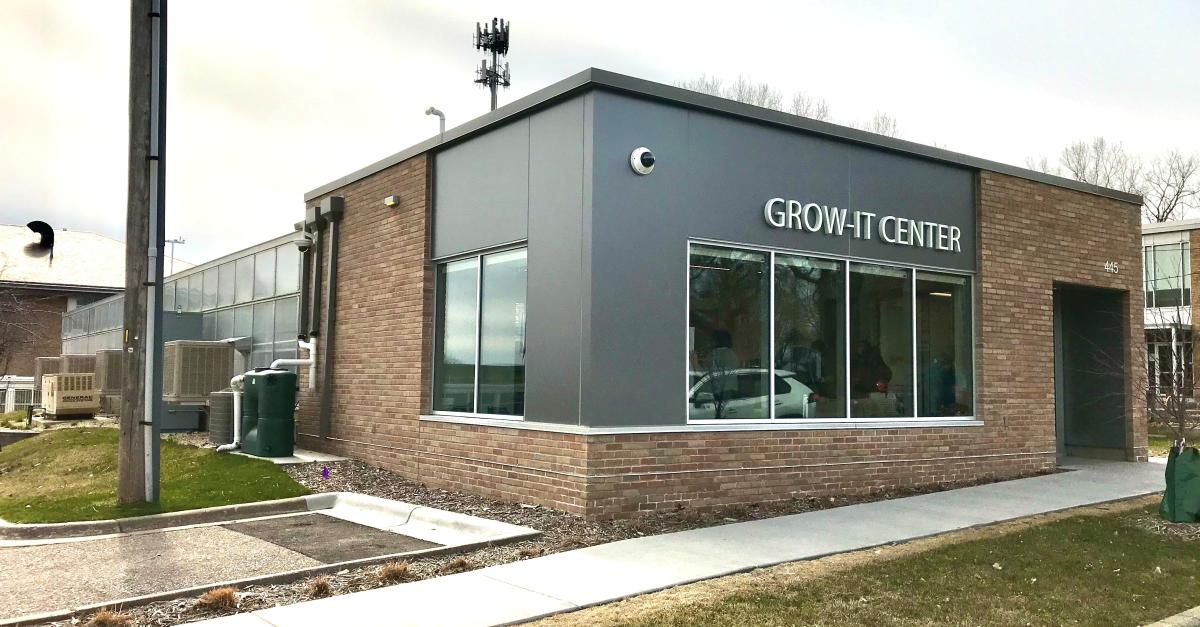The GROW-IT Center will be a community-university urban agricultural Gateway for Research, Outreach, Workforce Development, Innovation, and Teaching.
Partners are building a year-round learning hub for scientists, students of all ages, and community practitioners to exchange knowledge and grow healthy communities. Our purpose is to generate and disseminate best practices in sustainable urban food production, healthy food access and ecological preservation, and to inspire and prepare the next generation to address these issues.
With sincere thanks to our incredible partners and generous contributors, the GROW-IT Center, located at 445 Maria Avenue, was completed in Fall 2021. Features include a fully-renovated research lab and greenhouse (opened in Fall 2019) and a multi-purpose addition incorporating classroom technology, flexible furnishings and accessible restrooms. The facility hosts enhanced curriculum, student and faculty research, 10,000 spring plant starts, a permanent plant demonstration collection, experiential learning, and community education. New activity and partnerships are growing from this hub!
University departments, community organizations, and neighbors who are interested in exploring community-university collaboration related to these purposes are encouraged to contact community.engagement@metrostate.edu:
- urban food production
- healthy food access
- environmental sustainability.
GROW-IT Center strategic goals
- Increase educational opportunities—for youth, community members and university students
- Propagate plants—growing and contributing edible plants for community-based market gardens, local food pantries and backyard producers, and native plants for local ecological restoration
- Expand workforce development opportunities—in areas such as entrepreneurial food production, greenhouse management, community-based gardening, environmental restoration, and aquaponics
- Create and expand associate-to-baccalaureate degree career pathways—with college partners
- Conduct applied research—to meet the needs of traditionally underserved partners and local food producers, while contributing to the national discourse on issues related to agriculture, food, and sustainability
- Enhance local E-12 STEM education—in partnership with area youth organizations and local schools
- Strengthen community outreach—through demonstrations, workshops and continuing education
- Showcase our partnerships—that is, best practices and reciprocity in community-university work.
Thank you to our GROW-IT Center partners
The GROW-IT Center is made possible through the contributions of many dedicated individuals from the Dayton’s Bluff community and Metro State University, the Planning Team and Design Team, and unwavering support from Metro State and Minnesota State leaders, local funders, and public officials.
Primary Partners
- Metro State University, notably the Department of Natural Science, Department of Psychology, and Facilities and Operations
- Urban Roots, East Side Saint Paul's largest youth employer
- Friends of Swede Hollow, a grassroots environmental, community-building group
- First Lutheran Church, an urban mission-oriented ELCA congregation.
Public Officials
- Councilmember Jane Prince, City of Saint Paul Ward 7 (2015–present)
- MN Senator Foung Hawj (2012–present)
- Commissioner Dave Frederickson, MN Department of Agriculture (2011–2019)
- MN Representative Sheldon Johnson (2009–2015)
- MN Representative Rod Hamilton (2004–present)
Funding Sources
- Otto Bremer Trust
- Bush Foundation Community Innovation Fund
- F.R. Bigelow Foundation
- City of Saint Paul Neighborhood STAR Program
- CHS Foundation
- Hardenbergh Family Foundation
- Manitou Fund
- Metro State University
- Minnesota Department of Agriculture
- The McNeely Foundation
- Minnesota State
- The Saint Paul Foundation
GROW-IT Center Design Team
- Pamela Anderson, Principle, 292 Design Group
- Mark Asplen, Associate Professor and Department Chair, Natural Sciences, Metro State University*
- Hayley Ball, Executive Director, Urban Roots (2020–present)
- Jodi Bantley, Associate Director for Civic and Community Partnerships, Institute for Community Engagement and Scholarship, Metro State* ** ***
- Karin DuPaul, Neighbor and Board Member, Friends of Swede Hollow*
- August Hoffman, Professor, Psychology Department, Metro State *
- Christopher Maas, Director of Facilities, Metro State
- Greg Mellas, Director, Institute for Community Engagement and Scholarship, Metro State*
- Patsy Noble, Senior Director of Programs and Executive Director, Urban Roots (2014–2020)* **
- Steve Reed, Vice President and Chief Information Officer, Metro State
- Francis Schweigert, Dean, College of Community Studies and Public Affairs, Metro State (2018–2020)
- Kyle Swanson, Dean, College of Sciences, Metro State
- Deb Vos, Associate Vice President for University Advancement, Metro State University (retired)
- Maureen Acosta, Development Director, University Advancement, Metro State (2015–2021)
* Also served as a member of the GROW-IT Center Planning Team (October 2014–January 2018)
** Planning Team Co-Chair
*** Design Team Co-Chair
GROW-IT Center in the News
- GROW-IT Center: Cultivating Plants and Community on the Saint Paul Campus, News@Metro. September, 2020
- Audacious Goals: Building the Grow-It Center, Buzz Magazine. Spring, 2020
- Metropolitan State University Garden Experiment Helps Students Sow Human Connections, Star Tribune. May, 2020
- A Late Start to the GROW-IT Season, The Metropolitan Student Newspaper. June, 2019
- GROW-IT Center Funding Success and Future, News@Metro “In the Community.” August, 2018
- Green Light for Campus Greenhouse Renovation, The Metropolitan Student Newspaper. September, 2017
- Metro State’s New Program Brings Food, Community, Sustainability Together, Pioneer Press. November, 2015
- Professors Push to Reopen Metro State Greenhouse, Pioneer Press. October, 2014

